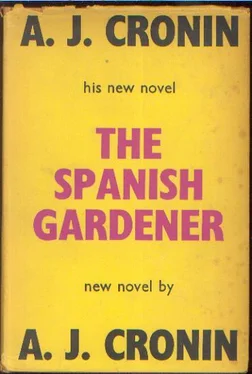Archibald Cronin - The Spanish gardener
Здесь есть возможность читать онлайн «Archibald Cronin - The Spanish gardener» весь текст электронной книги совершенно бесплатно (целиком полную версию без сокращений). В некоторых случаях можно слушать аудио, скачать через торрент в формате fb2 и присутствует краткое содержание. Жанр: Классическая проза, на английском языке. Описание произведения, (предисловие) а так же отзывы посетителей доступны на портале библиотеки ЛибКат.
- Название:The Spanish gardener
- Автор:
- Жанр:
- Год:неизвестен
- ISBN:нет данных
- Рейтинг книги:4 / 5. Голосов: 1
-
Избранное:Добавить в избранное
- Отзывы:
-
Ваша оценка:
- 80
- 1
- 2
- 3
- 4
- 5
The Spanish gardener: краткое содержание, описание и аннотация
Предлагаем к чтению аннотацию, описание, краткое содержание или предисловие (зависит от того, что написал сам автор книги «The Spanish gardener»). Если вы не нашли необходимую информацию о книге — напишите в комментариях, мы постараемся отыскать её.
The Spanish gardener — читать онлайн бесплатно полную книгу (весь текст) целиком
Ниже представлен текст книги, разбитый по страницам. Система сохранения места последней прочитанной страницы, позволяет с удобством читать онлайн бесплатно книгу «The Spanish gardener», без необходимости каждый раз заново искать на чём Вы остановились. Поставьте закладку, и сможете в любой момент перейти на страницу, на которой закончили чтение.
Интервал:
Закладка:
Under the Consul's cold, steady gaze José's hurt eyes fell, his lithe young figure appeared to droop, to lose virility and poise. Sadly cast down, he looked at the little bunch of perfumed blossoms, whose stems had grown warm in his perspiring hands, and as though not knowing what to do with this rejected offering, he placed it confusedly behind his ear. As he moved off, clumsily, to the myrtle patch, he perceived that Garcia, waiting beside the car, with that peculiar grimace, sardonic and at the same time blank, which gave to the impassive face a look of cruelty, had witnessed his humiliation. He bit his lip and turned away his head, as though to hide his burning cheeks.
The Consul drove to the town, sitting erect in the rear seat of his open automobile with the folding wind-screen lowered, the breeze blowing pleasantly about him. He felt eased and satisfied, like a man who has thrown off an irritating garment and now finds himself restored to comfort and normality. So agreeable was his humour that, when he entered the office and found Alvin Decker already bent over a pile of bills of lading in the outer room, he paused and, with a touch of compunction, remarked:
"Good morning, Decker. By the way, it's about time you and your wife came to see us at Casa Breza." As his assistant started up, in pleased surprise, he continued generously. "Come next Sunday, won't you? Come in the afternoon and we'll give you tea."
"Oh, thank you, sir," Alvin exclaimed, deeply gratified. "Thank you ever so much. I know that Mrs. Decker …"
"Quite," the Consul cut in, blandly. "We shall expect you both at five o'clock. Don't be late."
He passed into his private office where a fresh copy of the Echo de Paris , the wrapper carefully removed, lay upon his desk. But his present mood was too creative to waste upon the news-sheet. A quick survey showed that there was nothing of importance in his official mail. He sat down in his swivel chair and, permitting himself one of his rare departures from his punctilious routine, he drew out from the bottom drawer the package he had brought from the villa the day before—his manuscript on Malbranche.
To the rest of the world Nicholas Malbranche might be a dim, an unknown figure, but to Harrington Brande this forgotten Frenchman, who in the eighteenth century attempted to adopt the teachings of Descartes in the interests of theology, had become an exemplar in whose pedantic philosophy he found a pattern for his own behaviour, the sonorous echo of his own soul. That Malbranche should be so utterly neglected served merely to fan his ardour, to increase his pride that he, personally, would be hailed as the discoverer who had brought this paragon from obscurity into the bright light of day.
Over the past ten years, with mounting ambition, he had laboured prodigiously upon the compilation of a life of his hero. Several times he had sent the first half of his manuscript to leading publishing houses. The lack of response—none had evinced the slightest interest—was bitterly provoking, for he was not impervious to the flight of time or the success of others, yet it had neither surprised nor deterred the Consul. He considered the work too erudite to be vulgarly popular and, if necessary, proposed to produce it at his own expense, confident that when it reached the hands of the inner circle of European savants it would be instantly acclaimed. As a gesture of proud defiance he had named his son Francis Nicholas, despite the protests of his wife, whose lack of enthusiasm for his project had been, alas, but one of her lamentable disloyalties. Never, indeed, would he forgive her that episode when—having, in the first flush of his love, permitted her to read some chapters of the masterpiece—he had pressed confidently for her opinion.
"I'm afraid I don't know enough about it," she had answered evasively.
"Naturally I don't expect you to understand the philosophy, my dear. But the style … the drama … the movement … of the book?"
"No, really, Harrington … I'm no judge …”
"Oh, come now." He laughed playfully, fondling her hand. "Be as critical as you like. Speak the truth."
A difficult silence had followed. Then, concerned, she had smiled her shadowy smile, as though begging his forgiveness.
"If you really insist, Harrington, I'm afraid it bored me frightfully."
Ah, well, Malbranche had also had his Calvary. And now, all that was past, the manuscript was near completion and, as though in anticipation of his triumphant vindication, the Consul firmly took up his pen. But as he did so, unexpectedly he paused, and raised his head. As though seeing again that bar of humiliation upon José's brow, his eyes turned distant, strangely light, in his sallow face. Then, slowly, as he began to write, he smiled.
Chapter 6
WHEN Sunday came the Consul decided that he would receive the Deckers out of doors and give them tea in the garden. The afternoon was fine and warm; moreover, since twilight still fell early, his guests would thus have less opportunity to settle down and overstay their welcome. He ordered Garcia to arrange a table in the arbour, and to set out sandwiches, buttered rolls, and some of those local iced cakes called pan de jabon which he fancied might suit Mrs. Decker's taste.
As the hour drew near he was in an excellent humour. He had spent a delightful day with Nicholas, just the two of them together, perusing a folio of eighteenth-century An-dalusian prints which, like a true connoisseur, he had picked up for a few pesos from a little shop near the Consulate. Now, gazing across the arbour at his son, who looked particularly neat in a navy blue suit and stiff white collar, he was struck by the improvement in the boy's health. That air of delicate fragility had lessened, and the sickly pallor of his skin was now replaced by a tinge of healthy brown. Why, even his narrow shoulders seemed somehow to have acquired a more decided set. One must not run too fast of course. Yet it was a profound satisfaction that Nicholas should at last be responding to the care he had so constantly bestowed upon him.
Alvin and his wife arrived, punctually, in a hired car and, having received them graciously, the Consul proposed a stroll round the garden. While Alvin and Nicholas went ahead, he followed, more slowly, with Mrs. Decker. She was a quiet young woman with glasses and a fresh complexion, pretty enough, he supposed, in an ordinary sort of way, wearing a modest brown voile dress which he shrewdly guessed she had cut from paper patterns and made at home. Apparently she came from a small town in Michigan, was one of a large family, and had met Alvin on the campus of the State University. That she seemed sensible and good-natured did not prevent him from immediately classifying her as nondescript. Still, her anxiety to please was gratifying. Because of this, he set out to make himself agreeable and when they sat down to tea in the arbour he turned to her in his best style.
"Perhaps you would be kind enough to be our hostess? As you know, our establishment here is only a bachelor one. We miss the refinements of feminine society."
It amused him mildly to observe how she responded to this attention, filling and passing the teacups with awkward shyness. And again, in the desire to demonstrate his own powers, he began to talk in his most captivating manner. He was, when he chose, an interesting conversationalist, and now he exerted himself, drawing freely upon the lighter side of his experience, exhibiting himself in the role of learned gentleman and benevolent counsellor, relating little anecdotes, painting a picture of his life in Europe which was perhaps more glamorous than accurate.
"Oh, how wonderful!" Alvin sighed, as the Consul concluded an account of the coronation of King Albert which he had witnessed in the Cathedral at Brussels during his sojourn in Belgium. "We'd have given anything to be present at such a colourful ceremony. Wouldn't we, Carol?"
Читать дальшеИнтервал:
Закладка:
Похожие книги на «The Spanish gardener»
Представляем Вашему вниманию похожие книги на «The Spanish gardener» списком для выбора. Мы отобрали схожую по названию и смыслу литературу в надежде предоставить читателям больше вариантов отыскать новые, интересные, ещё непрочитанные произведения.
Обсуждение, отзывы о книге «The Spanish gardener» и просто собственные мнения читателей. Оставьте ваши комментарии, напишите, что Вы думаете о произведении, его смысле или главных героях. Укажите что конкретно понравилось, а что нет, и почему Вы так считаете.












